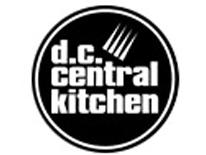
DC Central Kitchen
2010 Mayor's Environmental Excellence Award Winner:
Outstanding Achievement by a Small Facility
The DC Central Kitchen (DCCK) has never been solely about recycling food from local hospitality businesses or training unemployed men and women get “their own green” with foodservice jobs—their work has always been about the broader health of the larger community. That’s why, very early on, they dedicated themselves to recycling cans, cardboard and organic excess from our kitchen. Similarly, that’s why they buy so much local food—it’s great nutrition for the people they serve, but it also keeps the local economy healthy.
“Our mission – using food as a tool to strengthen bodies, empower minds and build communities – is, at its heart, green,” said Robert Egger, president of DCCK. “Part of building communities is making them healthier and stronger and key to that is working to make it better than it was before.”
Green Practices
- Complete recycling at DCCK – In addition to recycling all glass, paper, and cardboard, DCCK is “Re-using” cardboard and other packaging to reduce waste, and transitioning out of using Styrofoam completely. There has been an approximate 15-20% diversion of recycled goods out of the trash stream.
- Locally Sourced Food – DCCK buys locally grown food from farmers in Virginia, Maryland and Pennsylvania, as opposed to buying from national wholesalers. From June 1 – October 31, 2009, (peak harvest season in the mid-Atlantic region) 46% of their fresh produce purchases (or 50,000 pounds of fresh produce) were from local farms, up from 3% during that time period in 2008. In total, they redirected close to $20,000 away from national wholesalers and into the local economy by purchasing produce from area farms.
- This summer (2009), DCCK prepped, vacuum-sealed and froze more than 11,000 pounds of summer vegetables, such as corn and kale.
- Composting - DCCK and Washington Jesuit Academy (a Fresh Start food service contract) have started the first “from kitchen to garden” composting system. Compost made from the scraps of the WJA kitchen will be used to fertilize and help germinate the seeds that are going to be planted in the garden in the back of the school grounds.
- DCCK currently provides a partner farm with food scraps (approximately two 4-foot tall trash cans every other week) for use in generating fertilizer.
- Waste Grease Removal – DCCK has also partnered with a local waste grease removal company to provide for removal of the waste grease produced by the Kitchen’s activities. That fuel is then processed and converted into biodiesel. They currently provide two 50-gallon tubs of used cooking oil each month.
- Environmentally Friendly Catering – DCCK’s Fresh Start Catering is now using and/or evaluating biodegradable cutlery and straws, trays and clamshells made from wheat byproduct, serving and portion cups made entirely from plants as well as having catering trays containing 40% recycled resin.
- Reusable Materials For Kitchen Operations – They have extremely limited the use of all Styrofoam and non-reusable materials for internal food service. They are transitioning to the exclusive us of only flatware, dishes and mugs that can be reused
- Environmentally Sensitive Cleaning Products – DCCK has implemented a green cleaning program using Procter & Gamble products featuring their Green Guarantee.
- Reducing Community Food Waste – DCCK leads weekly gleaning trips in the summer and the fall where they take volunteer groups to pick surplus food at local farms.
- Sustainable Food Education – As part of the Culinary Job Training curriculum, there is a “Farm To Fork” lesson that includes a field trip to a farm, usually to a hydroponic lettuce field, followed by a cooking lesson at a local restaurant.
- Providing Food To Local Area Restaurants – When they travel to Virginia to get local produce (which, incidentally, costs significantly less than what they pay national wholesalers – the summer average produce price per pound was 36 cents from the farms and 64 cents from wholesalers), they also get paid to pick up local vegetables and meats for about 5 area restaurants. Through this initiative, they not only generate revenue to support the Kitchen’s programs, but they also help to green Washington, DC, by increasing the availability of local foods at area restaurants.
- Alternative Fuel Vehicle – DCCK is currently investigating converting one of its diesel delivery trucks to biodiesel to reduce emissions impact and carbon footprint.
Simply put—their experiment is centered on the dual vision that they can do powerful work on the street, while they simultaneously elevate important ideas that the business of the future can be green, exciting and profitable.



